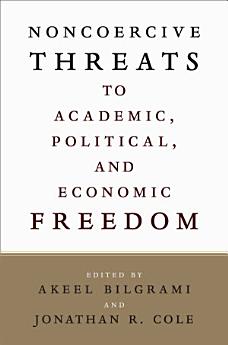Noncoercive Threats to Academic, Political, and Economic Freedom
Akeel Bilgrami · Jonathan R. Cole
Dec 2025 · Columbia University Press
Ebook
504
Pages
family_home
Eligible
info
infoThis book will become available on October 25, 2025. You will not be charged until it is released.
About this ebook
States and institutions in both conventionally authoritarian and formally democratic societies overtly circumscribe freedom in any number of ways. Yet there are also subtler forms by which authorities and cultural forces compromise the choices of individuals in ways that do not seem, at first glance, to be coercive. This book brings together a distinguished set of scholars to examine covert constraints on academic, political, and economic freedom from a variety of angles, developing surprising and timely new insights.
Ranging across philosophy, economics, law, health, science, art, and the media, luminaries from different fields expose threats to freedom within avowedly liberal and democratic institutions and cultures. Their incisive essays, both analytical and historical, emphasize how economic inequality, academic orthodoxy, media control, racism, and gender roles undermine the potential for human flourishing. By considering such multifarious noncoercive threats, they illuminate the vexed notion of freedom. Lively and learned, this book offers a provocative and urgent understanding of the often-unacknowledged forces that restrict our choices.
Contributors include David Bromwich, Eric Foner, Robert Gooding-Williams, Michael Ignatieff, Laura Kipnis, Anya Schiffrin, Joseph E. Stiglitz, and Geoffrey R. Stone. In an essay and an interview with the volume editors, Noam Chomsky addresses the neoliberal assault on academic freedom.
Ranging across philosophy, economics, law, health, science, art, and the media, luminaries from different fields expose threats to freedom within avowedly liberal and democratic institutions and cultures. Their incisive essays, both analytical and historical, emphasize how economic inequality, academic orthodoxy, media control, racism, and gender roles undermine the potential for human flourishing. By considering such multifarious noncoercive threats, they illuminate the vexed notion of freedom. Lively and learned, this book offers a provocative and urgent understanding of the often-unacknowledged forces that restrict our choices.
Contributors include David Bromwich, Eric Foner, Robert Gooding-Williams, Michael Ignatieff, Laura Kipnis, Anya Schiffrin, Joseph E. Stiglitz, and Geoffrey R. Stone. In an essay and an interview with the volume editors, Noam Chomsky addresses the neoliberal assault on academic freedom.
About the author
Akeel Bilgrami is Sidney Morgenbesser Professor of Philosophy and a faculty member of the Committee on Global Thought at Columbia University.
Jonathan R. Cole is John Mitchell Mason Professor of the University at Columbia University, where he was provost and dean of faculties from 1989 to 2003.
Bilgrami and Cole are the editors of Who’s Afraid of Academic Freedom? (Columbia, 2015).
Reading information
Smartphones and tablets
Install the Google Play Books app for Android and iPad/iPhone. It syncs automatically with your account and allows you to read online or offline wherever you are.
Laptops and computers
You can listen to audiobooks purchased on Google Play using your computer's web browser.
eReaders and other devices
To read on e-ink devices like Kobo eReaders, you'll need to download a file and transfer it to your device. Follow the detailed Help Center instructions to transfer the files to supported eReaders.




